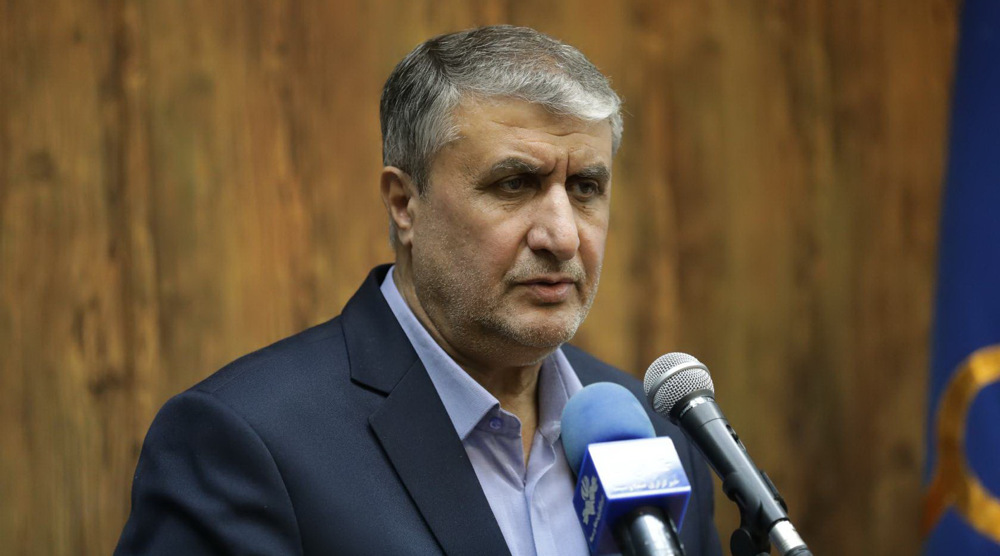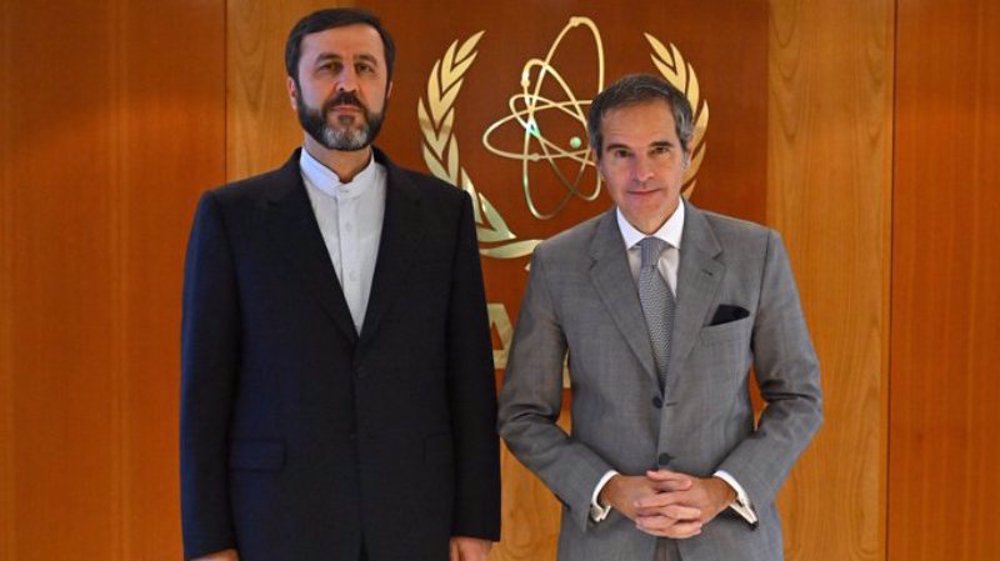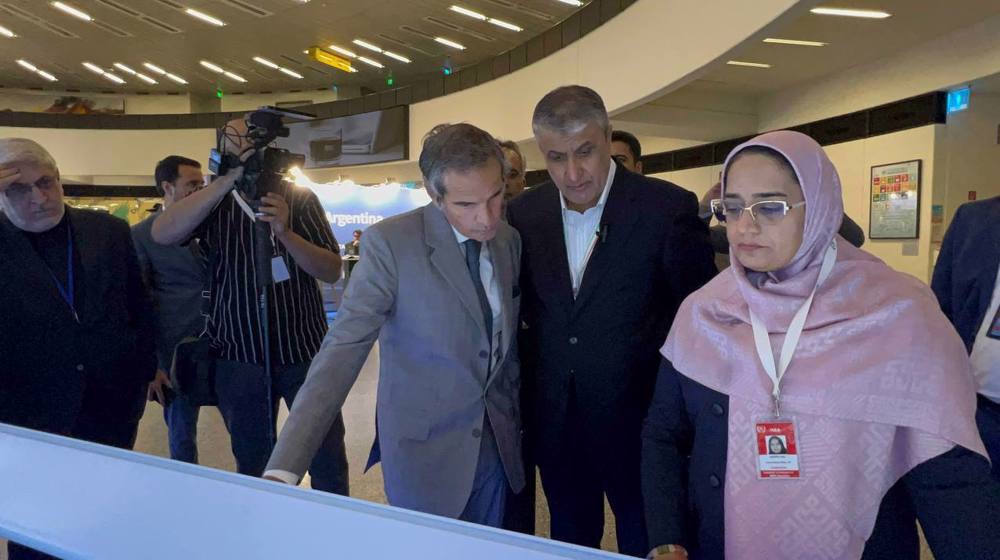Iran to suspend more JCPOA commitments if other parties fail to act: Official
A senior Iranian official has taken to task European signatories to a historic 2015 nuclear agreement for failing to fulfill their obligations, vowing that the Islamic Republic would suspend more commitments if they do not act seriously as per the accord.
"Be sure that if the opposite side does not carry out an appropriate measure within the next two weeks, we will take more steps to stop implementing our commitments," Kamal Kharrazi, who serves as the head of Iran's Strategic Council on Foreign Relations, said in a meeting with Britain's Middle East minister, Andrew Murrison, in Tehran on Sunday.
He; however, emphasized that Iran's suspension of its commitments would not be tantamount to the country's exit from the nuclear accord, officially known as the Joint Comprehensive Plan of Action (JCPOA).
The Iranian official added that Iran is determined about the suspension of some of its commitments under the JCPOA in accordance with the deal's text.
Iran and the five permanent members of the United Nations Security Council -- the United States, France, Britain, Russia and China -- plus Germany signed the nuclear agreement on July 14, 2015 and started implementing it on January 16, 2016.
Under the JCPOA, Iran undertook to put limits on its nuclear program in exchange for the removal of nuclear-related sanctions imposed against Tehran.
However, President Trump pulled his country out of the JCPOA in May 2018 and re-imposed harsh sanctions against the Islamic Republic in defiance of global criticisms, leaving the future of the historic deal in limbo.
Critical of Washington’s move, the European parties to the JCPOA vowed efforts to keep the deal in place by protecting Tehran against the US sanctions, but did little in practice.
On the first anniversary of the US withdrawal from the nuclear deal, Iran announced that it would suspend the implementation of some of its commitments under the deal, adding that it would stop exporting excess uranium and heavy water, setting a 60-day deadline for the five remaining parties to the deal to take practical measures towards ensuring its interests in the face of the American sanctions.
The spokesman of the Atomic Energy Organization of Iran (AEOI) said on June 19 that the country would not extend the 60-day deadline it has set for the remaining signatories to the multilateral nuclear deal to honor their commitments.
"Iran's two-month deadline to the remaining parties to the JCPOA cannot be extended," Behrouz Kamalvandi said.
Read more:
- Iran nuclear deal implementation only logical, correct path: Russian president
- US pressuring world into ignoring Security Council resolution on Iran: Russia FM
- Russia's president backs JCPOA, rejects what's being done against Iran
- Iran right to suspend some nuclear deal commitments: Russia FM
- Iran may quit JCPOA if nuclear case sent to Security Council: AEOI spokesman
Elsewhere in his remarks, Kharrazi said it would be a positive step if Europe launched its non-dollar mechanism aimed at facilitating trade with the Islamic Republic.
"Iran expects the opposite side to change its mind about the possibility that mounting pressure on Iran would bear fruit, and take necessary steps to provide financial resources for INSTEX (the mechanism, officially called the Instrument in Support of Trade Exchanges) while removing obstacles in financial and trade exchanges with Iran," the senior Iranian official added.
He noted that the removal of obstacles caused by sanctions and the normalization of trade and economic cooperation among countries would change the ongoing atmosphere.
Kharrazi expressed hope that the "European parties to the JCPOA would take measures during the remaining days before the end of Iran's 60-day deadline in order to establish normal trade and relations between the two sides and refrain from following suit with the US pressures and sanctions against Iran by acting in an independent manner."
Russian Deputy Foreign Minister Sergei Ryabkov on Friday signaled its willingness to secure Iran's interests in the oil and banking sectors if Europe's non-dollar mechanism is not launched.
He said that Moscow is ready to help Iran export its crude and ease restrictions on its banking system if Europe fails to launch its mechanism with Tehran.
The three European signatories to the JCPOA, unveiled late in January the long-awaited direct non-dollar payment mechanism meant to safeguard their trade ties with Tehran following the US withdrawal from the nuclear deal and in the face of the "toughest ever" sanctions imposed by the United States against the Islamic Republic.
In its initial stage, INSTEX will facilitate trade of humanitarian goods such as medicine, food and medical devices, but it will later be expanded to cover other areas of trade, including Iran’s oil sales.
However, it has not resulted in any trade deals so far.
Time for ‘gunboat diplomacy’ over: IAEA spokesman
In a related development, the AEOI spokesman also met with Murrison later on Sunday, noting that the United States’ destructive policies have only led to the intensification of tensions in the region.
“The time for gunboat diplomacy is over,” Kamalvandi, who is also the AEOI’s deputy for international, legal and parliamentary affairs, said in a post in the organization’s Instagram account.

He added, “A review of developments in the past few weeks should have proved to the Americans that their destructive policies have not only failed to bear the desirable result, but have only led to intensification of tensions.”
Noting that it was important for other signatories to the JCPOA to remain committed to their obligations, the AEOI spokesman said Iran is serious in its decision to reduce its compliance with the nuclear accord based on its articles 26 and 36.
Kamalvandi emphasized that Iran will continue to produce enriched uranium in accordance with previous directives by President Hassan Rouhani and the Supreme National Security Council.
He also stressed that Washington's anti-Iran threats and maximum pressure policy are doomed to fail.
The British minister, for his part, said his country supports the historic nuclear deal and calls on Iran to show self-restraint and continue implementing its commitments under the JCPOA as any violation of those commitments could have serious and dangerous consequences.
UNRWA warns of humanitarian collapse in Gaza
'Hello my enemies': Lebanese journalist on Israeli threats and his resolve to continue
Outrage in France as MP proposes bill to ban criticism of Israel
VIDEO | The strategy of Hezbollah in war
Israeli military withdraws several brigades from southern Lebanon: Report
48-year-old Palestinian man serving 48 life terms completes 22 years in Israeli jails
From MKO to Tondar, how Germany became safe haven for anti-Iran terror groups
Hamas open to any proposal aiming to end Gaza war: Hamdan












 This makes it easy to access the Press TV website
This makes it easy to access the Press TV website